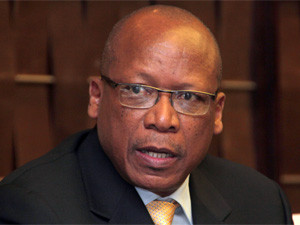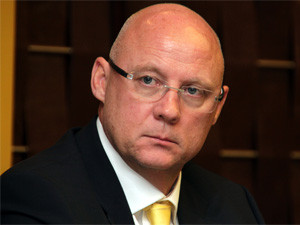
Strong competition in key markets, margin pressure, a need to focus on cost controls and a push into new sources of revenue by MTN shows the company - and the sector - is at a tipping point.
While MTN reported revenue growth of 9.8%, to R65.2 billion in the first half of the year, this was largely boosted by the weaker rand. If the currency had remained at the same level year-on-year, revenue would only have grown 1.9%; showing that traditional sources of gains are no longer lucrative.
MTN's slim revenue gain echoes what the market saw in May, when Vodacom said its service revenue for the year to March only gained 2.9% in constant currency; a measure that strips out the effects of shifting foreign exchange.
While Vestact believes the future of MTN's business lies beyond South Africa's borders, into economies that are at a far lower base than locally, Ovum analyst Richard Hurst says these markets will also eventually become saturated, and echo declining growth rates seen in emerging markets.
MTN is seeking to reposition itself and move into adjacent services, while continuing to look for acquisition opportunities. Vestact notes that it continues to buy stock in the operator as it believes cellular companies will continue to reinvent themselves.
Maturation point
Hurst says the growth is simply no longer there for cellular firms, especially in markets where penetration is increasing and there is regulatory pressure. "There's an elephant in the room."
MTN's "two big daddy" businesses, as Vestact calls them, South Africa and Nigeria, were both impacted by tariff cuts, which stunted revenue growth.

"This business is still dominated by Nigeria and South Africa, although the South African profit contribution relative to their Nigerian counterpart is falling quickly." This, says Vestact, shows competition locally is a "whole lot more cutthroat".
Vestact notes that Nigeria contributes 34% to group revenue, but 51% to group earnings before interest and tax (Ebit), while South Africa contributes 31% to overall group revenues, but a more modest 23% to group Ebit.
Hurst adds that, locally, operators are looking at each other's subscriber pools to grow. MTN was caught napping by responding too slowly to the price war initiated by Cell C, which saw it lose both customers and revenue, he notes.
Margins will come under pressure in SA, and both data and call revenues are falling, notes Vestact. Despite this, MTN's overall margin - at 42.5% - has been maintained as "more and more" customers adopt smartphones and data use grows, it says.
Vestact adds that average revenue per user is falling across the board, except - strangely - in Iran, which is likely due to its stabilising currency.
Driving data
The growth of the business is in data services, as voice revenues are declining in MTN's most mature market ? South Africa ? says Vestact. Data now represents 20% of all revenue locally, despite prices dropping 25% for the service, it notes.
MTN added 1.6 million new data consumers for the period, up to 13.5 million in total, says Vestact. MTN has been pushing smartphone and data device adoption and is looking at ways to bring cheaper handsets to the market.
"Data across the group looks really encouraging and in their Nigerian operation (the most important), they are making huge progress." Yet, Vestact points out that 5.3 million smartphones and 230 000 dongles hardly make a dent, relative to the rest of the country.
Vestact says there are perhaps only 10 million smartphones in Nigeria; one for every 16 people. "That is way too low."
Hurst adds, however, that while data is seeing great growth, this is at lower margins. "That's the devil in the growth of data."
Operators have no choice but to find new sources of revenue, and they have to be smart about it, says Hurst. He points out that, while emerging markets are still showing growth, this will change as they mature.
Vodacom and MTN should be in a commanding position and should be able to throw resources into new growth avenues, says Hurst. "They're between a rock and a hard place...the heydays of cellular have been over for a long time."
Plans
While Vodacom is looking to Africa for growth, wanting to get revenue from the continent to a level of between 25% and 30% in the next three years, MTN is looking for new revenue sources, and potential acquisitions.

MTN will almost have to reengineer its business to reflect the current pricing situation, says CEO and president Sifiso Dabengwa.
Dabengwa says MTN experienced "significant" price erosion in the past two years and - locally - it did not react quickly enough. Its slow pace impacted on subscriber gains, weighing on MTN's local revenue, to Cell C's benefit.
MTN is now looking at adjacencies, such as financial services, as well as other opportunities to create new sources of revenue, including Internet-based opportunities, says Dabengwa. It is also working with small start-ups to develop new services while focusing on organic growth and the issue of costs.
The operator hopes to benefit from being a cornerstone investor in Amadeus Capital Partners, a technology investor. Amadeus recently held a first close at $75 million on the first of its fourth generation of funds.
MTN approached Amadeus when it had started to develop investment opportunities in online and mobile applications and services relevant to the needs of an emerging middle class of consumers.
The two worked together to refine an investment proposal focused on technologies that leap-frog desktop applications and services, to those designed specifically for 'mobile first' and the technologies and platforms that underpin such services.
Brett Goschen, its recently-appointed CFO, adds there are opportunities in value-added content that offer higher margins, such as applications that can drive more revenue. Its music-download app, for example, has been successful in Nigeria.
It is about extending the scope of services to grow data revenue to more than just a concept of cost per megabit, says Goschen.
The cellular giant, which expects to have about 210 million subscribers by year-end, will push more into financial services. However, MTN SA CEO Zunaid Bulbulia was coy about its plans, saying he could not elaborate as to what, exactly, it was doing in financial services.
MTN offers mobile money solutions in 15 of its 22 countries and, in Uganda, it accounts for 11% of revenue.
Talking shop
MTN has a dedicated merger and acquisition team that is constantly on the hunt, and it also enters preliminary discussions when a deal is put on the table that may be worth looking at, notes Dabengwa.
While there is no specific transaction that MTN is looking at, it is "continuously" looking, says Dabengwa. MTN would consider India again, he adds.
In 2009, a second attempt at a marriage between MTN and India's Bharti Airtel fell apart just before the altar because of regulatory hurdles. MTN had also previously tried to hook up with India's Reliance Communications.
Dabwenga says MTN has pondered India for the last seven or eight years and it is a country the operator is "keen on". Beforehand, there were challenges that made India unattractive, but it is now through the worst and it is worth considering again, he says.
Cost-pushers
Keeping a lid on costs is also part of MTN's strategy.

Goschen explains that one of the biggest drivers of operating expenses is its network, which it continuously expands to keep up with demand off the back of sharply-falling tariffs.
In the first half of the year, MTN spent R12.8 billion on its network to add 2 130 2G and 1 800 3G sites. It says this is "in line with our strategy to improve the quality of our service offering to more customers and remains a key element in securing continued growth over the medium-term".
Goschen says MTN is taking more of a managed services approach and is looking at ways to trim costs. Some of the increases are temporary, he adds.
The cost of commissions paid out has also risen as the group pushes more smartphones onto its network in a bid to boost data consumption.
Goschen adds that MTN is also having a "close" look at its staff numbers group-wide, while Bulbulia adds that some of its local outsourced deals may be rationalised.
Dabengwa notes the company wants to push its margin back to where it was last year. There will be long-term winners and losers, and MTN has to find the right features and services, over and above simple connectivity, and do that better than its competitors, he says.
Share